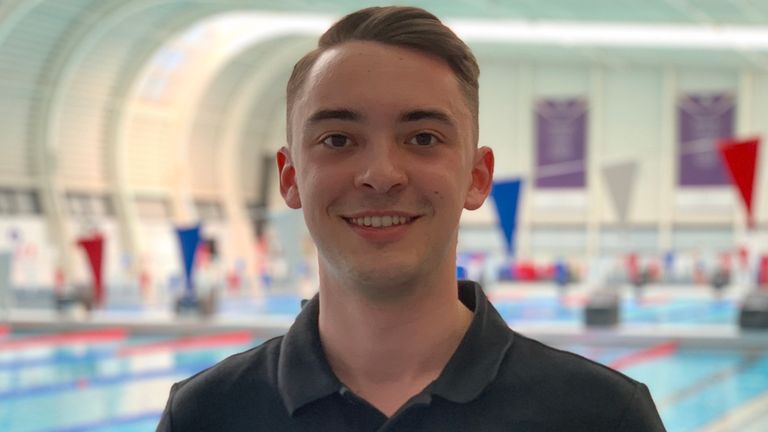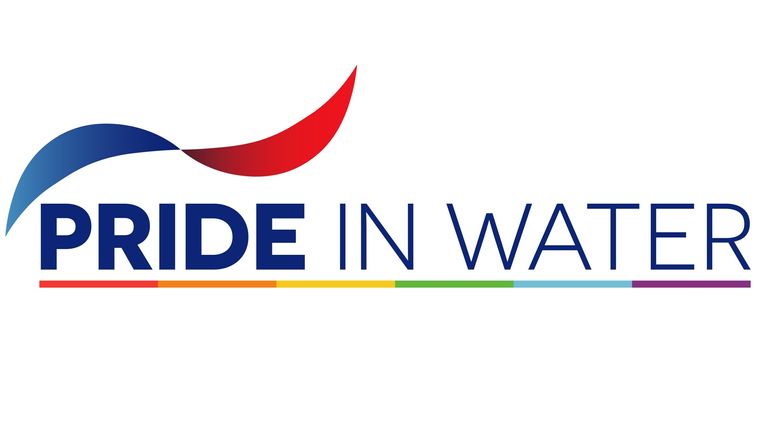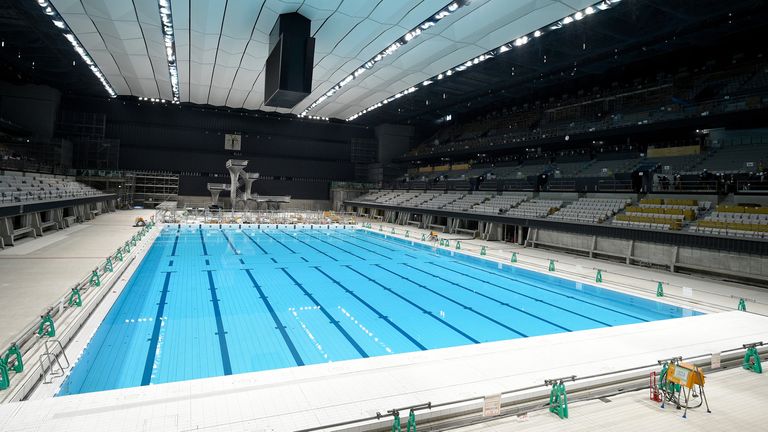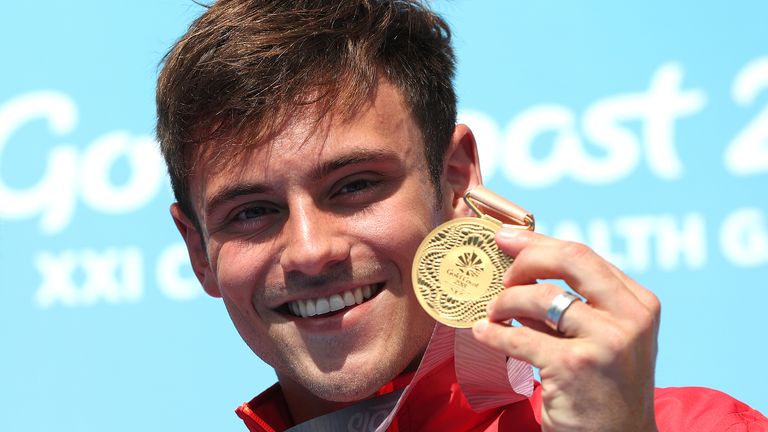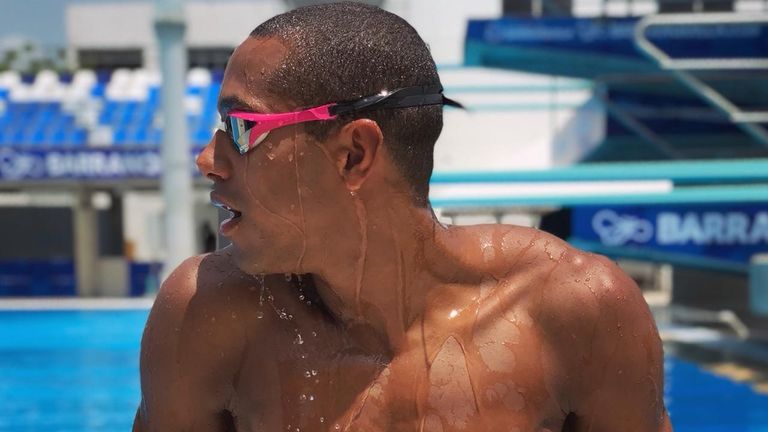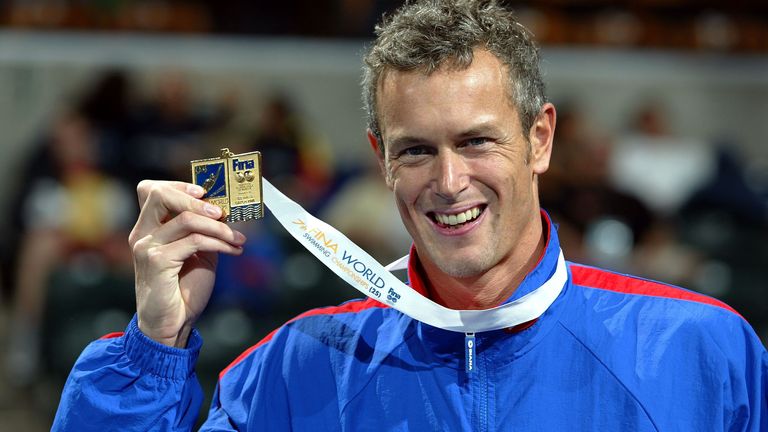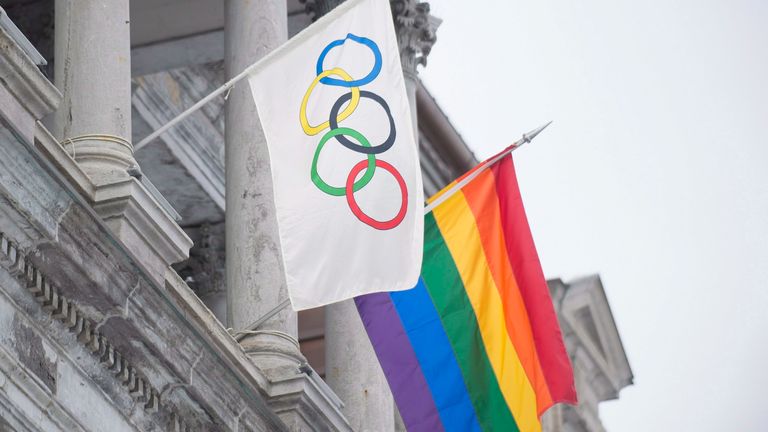Pride In Water: British Swimming launches new LGBT+ network in aquatic sports
In a world of marginal gains, can inclusion deliver an extra edge? Josh Rudd, a performance professional working in elite swimming, wants more sports to give Pride networks a shot
Monday 3 August 2020 13:28, UK
You won't see 'Team LGBT' listed on the official Rio 2016 medal table - but out athletes enjoyed an outstanding Olympic Games four years ago.
Of 53 athletes from across the world who were known publicly to be LGBT+ when they competed in Brazil, 25 won medals - a success rate of 47 per cent. Whether compiled on golds won or the total haul, a table with 'Team LGBT' included would place such a group inside the top 20.
Should the global pandemic relent and the Tokyo Games go ahead next summer, it's been estimated well over 100 participants in Japan will be LGBT+ and out. Amid growing evidence that suggests their sporting performance could be enhanced through authenticity within an inclusive culture, national governing bodies are becoming more attuned to how they can best provide support and a sense of community to all.
With that in mind, British Swimming has announced the launch of Pride In Water - a network group for LGBT+ people and allies in aquatic sports. A similar group called the Athletics Pride Network has successfully been established in track and field in recent months, and inspired by both that and ongoing conversations elsewhere in elite sport, it's a project that PIW founder Josh Rudd believes has huge potential to not only benefit athletes on a personal level but also help them produce better results in the water as well.
Rudd works for the governing body through the English Institute of Sport (EIS) as a Performance Lifestyle Advisor - a role in which he offers assistance to elite athletes in a variety of ways, such as providing advice on personal finances, securing accommodation, and talking about their mental health. "Effectively, it's supporting an athlete to understand themselves holistically as individuals rather than just as sports people," he tells Sky Sports. He is confident having the Pride In Water network in place will further understanding of inclusion across swimming, para-swimming, diving, water polo, synchro, and other aquatic sports.
"Support networks are always something of merit," says Rudd. This year in particular has brought unforeseen challenges and pressures to many of the swimmers and coaches he works with. "If you'd said to me at the start of the year that Tokyo wasn't even going to go ahead, well... then there was the decision to postpone the Games which really dragged on, and from a mental health point of view, it had an effect on everyone.
"What it also meant was that my conversations with athletes when they were in lockdown became more philosophical. Nine months out from the Olympics, they were solely focused on performance. Suddenly, we were talking about their life away from sport, and being more open and honest with one another.
"That got me thinking about all the things that would go on in their lives that are unrelated to being an athlete. Who do they have to turn to? And what if there's something you don't feel you can talk to your parents or family about?"
Between the ages of 14 and 24, Rudd's primary sports pursuit was football refereeing. He was able to draw upon some of his own experiences of being a young gay man in that environment, where he did not always feel entirely comfortable. "My identity as a referee was very different to my identity as a person out of football - that's just how it was.
"That's not to say others in that environment cared, or wanted to know - maybe they already thought that I might not be straight. But at the same time, by just allowing someone to feel comfortable within their own self, does that produce a better referee, or athlete, or support staff member? I think it does - it allows us to be authentic, to be the people that we are. So with this, my professional and personal worlds have collided."
Further conversations within British Swimming and the EIS, along with UK Sport, encouraged Rudd to develop his idea for a Pride network. "There's already some great work being done by the EIS, not least around female athlete health, world-leading projects on physiology, data, and how to get those marginal gains. With athletes, I'm often asking - what about them as people?
"I work within a sports science and sports medicine team that talks about data, strength and conditioning plans, and physiological responses. I'm able to offer context to how the athletes are feeling which adds another dimension to it. We can talk for hours about why they might not be hitting numbers and not getting the right data, but if I can offer a different perspective about how an athlete might have a lot going on in their personal life, we can factor that in. That gives a more well-rounded understanding of why that athlete might not be performing at their very best."
Peace and prosperity
The connection between sport and being LGBT+ can be complicated for an athlete and not immediately evident to their coach. The more Rudd explored the topic, the more he appreciated what Pride In Water could offer. "It's certainly not saying to LGBT+ people in these sports that they should come out, but it's letting them know the network is there.
"We're also thinking about our pathway athletes, and our staff too. I posed a rhetorical question - how many athletes do we lose within the swimming pathway that don't feel comfortable with being an athlete and being LGBT+ simultaneously? You can never answer or quantify that, but that also translates into how many medals might swimming have lost to this in the past.
"That to me was a big one, because a lot of what I do is focused on how we can get the most out of an athlete to perform at the best level and ensure we win medals at major competitions. That's the bread and butter of elite sport, and athletes should never have to worry about questions like, 'do I fit? Am I welcome in that environment?'"
Among the 'Team LGBT' medallists at Rio was Tom Daley, whose visibility as an out athlete since the age of 19 has been an inspiration to many LGBT+ people worldwide, not least his friend Michael Gunning. British-born Gunning switched to swim internationally for Jamaica in 2017, and came out publicly through competing in a reality TV dating show the following year. He still trains in Stockport and retains close ties to British Swimming.
Now 26, he's excited by the emergence of Pride In Water and feels the network can have a big impact. "I feel representation is really important. Growing up, I never really had anyone that I felt inspired to be like. Just to know I wasn't 'the only one' would have been massive for me.
"Having Pride In Water will help to let everyone know in aquatics that it's OK to be yourself, no matter your sexual orientation, gender identity, or the colour of your skin."
Gunning has already been approached to connect with the network and feels the role it can play for those from other Commonwealth nations or even further afield cannot be underestimated. "It's going to provide a bank of knowledge - British Swimming has helped me so much and for anyone who might not want to be out in their respective countries or associations for whatever reason, they can reach out and get good advice.
"Also it's great that it's open to other sports, to build a community across aquatics, and that allies are welcome because they're just as important. Adam Peaty is an example of someone in swimming who's given me a lot of support and that I'm proud to call a friend, and that means a lot."
Former world champion Mark Foster, who came out publicly as gay after retiring from competition, has also given his backing to the new network. "I'm really proud to support this initiative," he said. "I think it's really important for our sport and our athletes to have an environment in which they can feel totally comfortable with who they are, and have role models around them.
"I know for me as a swimmer, this would have been helpful, and I hope it can help in nurturing athletes and champions of the future."
Now 50, Foster competed at five Olympic Games but never came away from those competitions with a medal. In an interview with The Guardian in 2017, he reflected on his career, saying: "When you've spent your whole life shying away from scrutiny, it must have some impact. I've lost races and broken world records by 100ths of seconds. I'm not saying I would've won the Olympics but, if I wasn't subconsciously processing all this stuff, I would have achieved more."
A snowball effect?
Like Gunning, Rudd is hopeful there will be enthusiasm from allies to connect to Pride In Water, such as coaches who appreciate the value of creating inclusive environments. He cites an example from the Athletics Pride Network. "I remember speaking to UK Athletics' Donna Fraser and she said about the initial network presentation they put on at Loughborough.
"A coach who wasn't LGBT+ herself was there because she wanted to get a better understanding of how to support her athletes. If we can drive that kind of conversation as well, that's brilliant for anyone who may be struggling and feels open to talking and feel more comfortable in their environment."
With athletics and aquatics now having their own LGBT+ networks, will we see more sports follow suit? Rudd recognises that some NGBs, particularly those that are smaller in size, might prefer to bond together and he is keen to help facilitate that dialogue. "I like the idea of a cross-sport network too. The big sports will inevitably have support groups like this within their own systems, but what if you have an athlete in another sport who doesn't have that opportunity for an in-house network? They may have some worries and concerns and want to access support. A cross-sport group may be what's needed.
"The number of athletes we have in elite sport alone is huge, and we know the number of those who we will take to Tokyo that are LGBT+ and out will be bigger than ever before. That in itself shows the need for more support. Now we're seeing an appetite to build networks alongside a message that it's OK to be yourself within your environment - it's about making yourself feel comfortable so that you haven't got to worry."
To connect and learn more, follow @prideinwater on Twitter or contact prideinwater@swimming.org.
Sky Sports is a member of TeamPride which supports Stonewall's Rainbow Laces campaign. Your experiences of being LGBT+ or an ally in sport could help to inspire others - if you're interested in sharing your story with our readers, please contact us here.
